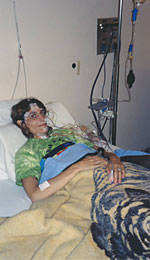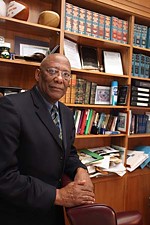Reefer Madness
Patient Acquitted in Medi-Pot Case
By Jordan Smith, Fri., April 4, 2008
Amarillo resident Tim Stevens knew he was going to get sick.
Diagnosed with HIV in 1986, for eight years now Stevens has also suffered from an associated illness known as cyclical vomiting syndrome, which is marked by prolonged periods of extreme nausea and vomiting – Stevens once had an attack that lasted two weeks. "It's even worse than it sounds," said Stevens' attorney Jeff Blackburn, best known for his work in the infamous 1999 Tulia drug case. CVS has landed Stevens in the hospital twice, where he was treated, in part, with blood transfusions. Over the years, however, Stevens has developed an uncanny ability to predict when an attack of CVS is looming – similar in nature to sensations some epileptics experience before a seizure. Stevens had developed a prodromal reaction that helped him to accurately predict an attack. So when he woke up one day last October feeling those symptoms, he knew the vomiting would soon return. What he'd also learned over the years was that smoking marijuana helped to ease the suffering associated with CVS. With that in mind, Stevens went out with $10 in his pocket to buy some pot; back at home, he sat on the porch smoking a bit, with the remainder of the roughly 3 grams he'd purchased in his pocket. Little did Stevens know, the CVS would be the least of his problems that morning. According to Blackburn, Stevens was soon confronted by Amarillo Police officers, who'd received a confidential "tip" that Stevens was smoking pot on the porch. Stevens explained his situation, Blackburn said, but the cops weren't buying and instead arrested Stevens for pot possession, a class B misdemeanor punishable by up to 180 days in jail and/or a $2,000 fine. "Had this guy been in his home using it, it is reasonable to say this issue wouldn't have come up," Potter County Attorney Scott Brumley told the Amarillo Globe-News. "This guy isn't the first one who has come to court with a sad story to supposedly excuse criminal conduct."
For sure, pot possession is still considered "criminal" under the state penal code – but, thanks to a state law passed last year, it isn't necessarily a jailable offense. In an effort to ease jail overcrowding, lawmakers in 2007 passed House Bill 2391, which downgraded a host of minor crimes to ticket-only offenses. This list includes minor marijuana possession – that is, possession of less than 4 ounces, meaning Stevens, with less than 3 grams on him, was eligible for citation only, which would've given the county some cash instead of opting for incarceration and prosecution, which, clearly, would rack up a not-insignificant cost to the county. But apparently cost-benefit analysis is foreign to the folks in Amarillo – ironic considering HB 2391 was championed in the Senate by Amarillo Republican Kel Seliger – and Stevens was carted off to jail. "They could've given him a ticket," says Blackburn, "but the position in Amarillo is, 'We don't do that.'"
On March 25, however, Stevens – and, in another way, the rule of law – was vindicated when it took jurors just 11 minutes to find Stevens not guilty of criminal possession. It wasn't a case of jury nullification – where jurors refuse to apply a law they feel is just plain wrong; rather, Stevens prevailed because the jurors followed the law, considered the penal code, and instead chose to vote in Stevens' favor based on the doctrine of "medical necessity." In essence, Blackburn argued to the jurors that Stevens' breaking the law was necessary to prevent a harm worse than the one the pot law was meant to prevent. It worked; after doing some research, Blackburn says he believes it's the first time the medical-necessity doctrine was successful in a Texas medi-pot case. "It was the old samurai strategy," he said, "using something dead and old to bring something else to life – here we used a really old law that nobody thought would apply and made it apply." Blackburn said that he found at least two similar cases where the defense had been raised unsuccessfully; on review, the Court of Criminal Appeals upheld the convictions. Key to the success of his case, Blackburn said, was the testimony of expert witness Dr. Steve Jenison, medical director for the New Mexico Department of Health's Infectious Disease Bureau, who testified about the efficacy of marijuana in treating nausea and how, for many patients, medi-mari is superior to the prescription alternatives – like pharmaceutical pot-derived Marinol, for example, which, notably, must be taken orally and thus can be difficult for someone suffering from CVS to keep down.
In all, Blackburn says that the Stevens case will serve as an example of the successful application of the med-necessity defense in a medi-pot case. More important, however, Blackburn says the Stevens case highlights the chasm between people and their government when it comes to pot. Indeed, while public opinion polling consistently reveals strong support (more than 70%) for legalized medi-mari, government officials – including many elected district attorneys, not to mention the federal narcos – insist pot is bad and that the people agree with their assertion. "We all know that there is a big gap between what ordinary people think about marijuana and what the government says ordinary people think about marijuana," Blackburn said. "This case shows just how big that gap is."
Meanwhile, Stevens says he'll try Marinol, even though he doesn't have much faith it'll help him. If it doesn't, he said, he'll probably pack it up and move to New Mexico, where medi-pot is legal. "I will abide by Texas law," he told the Globe-News, "or [will] relocate to New Mexico where [medi-pot] is available to people like me."
Got something to say on the subject? Send a letter to the editor.










